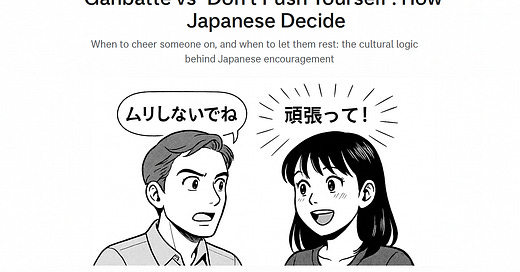Q&A Friday: “Ganbatte” vs “Don’t Push Yourself” — How Japanese Decide
When to cheer someone on, and when to let them rest: the cultural logic behind Japanese encouragement.
You might think "Ganbatte!" is just the Japanese version of "Good luck!" or "Do your best!" But depending on the context, it can sound like encouragement, pressure, or even an emotional check-in.
One Reddit user from Australia pointed out:
"In Australia, it's common to say 'Don't work too hard' as a farewell phrase. We say it all the time. It reflects our 'enjoy life' attitude. So when I came to Japan and everyone kept saying ‘Ganbatte!’ I was like, wow, this is really different."
Exactly.
Japanese people are constantly adjusting between saying “頑張って” and “無理しないでね” (“Don’t push yourself”). But what decides which one they choose?
What makes the difference?
Here are a few quiet factors that shape the choice:
The other person’s personality
Are they ambitious? Sensitive? Quietly trying their best?The relationship
Close friend, coworker, junior, client? Each carries different expectations.Where the person is now
Are they already at their limit? Or are they still just getting started?
Sometimes people say "Ganbatte" even when they know the other person is struggling. But often, Japanese speakers instinctively read the air and choose their encouragement based on emotional load.
Not quite "Good luck"
One English speaker said they assumed "Ganbatte" meant "Best of luck." But here's the catch:
In Japanese, luck isn’t really the point.
If anything, saying "Good luck!" sounds a little too passive. Almost like you’re leaving it up to fate.
Japanese has a more effort-driven mindset. People don't want to leave it to luck. They want to overcome it. "Ganbatte" often implies: I know you’ll try. I believe in your effort.
A quiet decision
So how do Japanese people choose between these two?
頑張って = I believe in your effort.
無理しないでね = I care about your well-being.
They may not say it out loud, but they're deciding:
Which message does this person need more right now?
Encouragement or compassion?
And in that quiet decision lies the heart of Japanese communication.
What about you?
In your own culture or language, how do you wish people good luck?
And how do you show care without sounding condescending?
I’d love to hear how your language expresses this balance.
💡 Want to help shape the future of this newsletter?
Take this 1-minute reader survey to let me know what you enjoy and what you'd like to see more of.
Take Survey
You'll be taken to a short external survey (Tally). No login needed.




